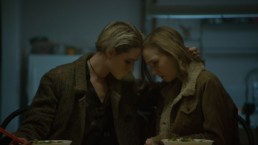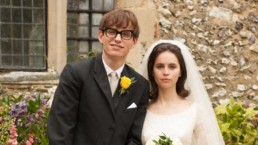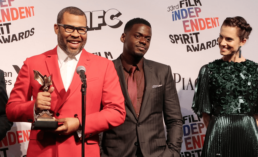'Allure' Review: Disturbing and Distasteful View of Abuse Culture
The power-balance in relationships is very much in the spotlight as of late, exposing the physical, mental, and emotional abuse that has been too often hidden from public knowledge.
One of the more vocal proponents of the #MeToo and Time's Up movements is actor and activist Evan Rachel Wood. Wood was most recently seen in February giving an impassioned speech to Congress about her own past as a sexual assault victim and has since become a symbol of feminism and an inspiration for social justice. So, imagine my surprise, to see her propelling the type of disgusting and inappropriate behavior she has personally fought so passionately against in Allure.
The film opens in a dingy motel room where a blindfolded man lays passively on the bed while a woman has aggressive sex with him. Clearly a pay-for-play situation, the woman grows frustrated at his lack of "ability" and tells him to leave. Laura (Evan Rachel Wood) saves her sex work escapades for nighttime as she spends her days working for her father’s company cleaning houses. It is at one of these houses where she meets, and quickly forms an unnatural relationship with, her client's 16-year-old daughter, Eva (Julia Sarah Stone). Like many teenagers, Eva's relationship with her mother has become strained after she refuses to move in with her mom's new boyfriend. Laura, sensing the girl's vulnerability, convinces Eva to run away with her. Eva agrees, and so begins the unraveling of uncomfortable viewing that is Allure.
The worst part is that the film never condemns this behavior, which I found absurd! Especially in this time of such predator accountability.
Laura is essentially a child abductor, rapist, and a master manipulator (while her age is never specified, she is at least 21- old enough to buy alcohol, own or rent a home, and live alone). Laura keeps Eva hostage in her home and convinces her that they are soul mates. She makes Eva drink alcohol (reminder- she is 16) and entices her to smoke pot. She massages Eva's shoulders, whispering "just relax", and "share a bed with me, you'll be more comfortable." They do end up sharing a bed and end up having sex.
The worst part is that the film never condemns this behavior, which I found absurd! Especially in this time of such predator accountability. At the end of the film, Laura gets to make peace with herself which is somehow supposed to make up for her perpetually disturbing behavior. And while the film gives Laura a happy ending, one which she clearly doesn't deserve, the real victim, Eva, never makes peace with her mother, nor finds justice after being held hostage.
Allure is the directorial debut for Carlos and Jason Sanchez, two brothers whose work has previously been seen in music videos and Canadian advertisements. What is missing here is any kind of female perspective behind the lens. Allure explores the dark side of human behavior, but instead of holding the offender accountable, it plays more like a superficial lesbian film made by men for men. I don't know who I am more disappointed by– the Sanchez brothers for writing/directing this off-kilter film, or Evan Rachel Wood for taking any part in it.
105 minutes. 'Allure' is unrated. Opening this Friday at Arena Cinema and on VOD.
Revisiting 'The Theory of Everything' in Memoriam of Stephen Hawking and Jóhann Jóhannsson
This review originally ran on November 6, 2014
This week, we remember the late Stephen Hawking as well as the late Oscar-winning composer Jóhann Jóhannsson by running our initial review for the 2014 biopic, The Theory of Everything.
We will forever remember these two profoundly influential, brilliant, and inspiring men. Rest in peace.
I am usually drawn to biopic films for a number of reasons. I appreciate any actor’s attempt to become another real-life figure. I especially admire their willingness to be overly-critiqued for taking on that part when the literal person to draw reference against can be so easily accessed and therefore allow us to easily pick out those flaws in the performance. And what could be more daunting of a task than portraying one of the most brilliant men to have ever lived, as Eddie Redmayne does in the Stephen Hawking biopic, The Theory of Everything? Much to my surprise – and delight – the powerhouse performances, beautiful camerawork, and emotional score make this film nearly critique-less.
The Theory of Everything tells the true story of how Hawing met and fell in love with his first wife. The film begins with young Stephen, (Eddie Redmayne) who meets young Jane (Felicity Jones) at a University gathering. Wide-eyed and naive, the two quickly fall in love. Jane, being an artistic and religious girl, and Stephen, being the nerdy astrophysicist and atheist, exemplify how “opposites attract,” and realize that their future will know no bounds. But when 21-year-old Stephen is suddenly hit with a diagnosis of the motor neuron disease ALS (or, Lou Gehrig’s disease) and a two-year life expectancy, the couple doubles down on their commitment to each other and are soon married, with children on the way. All the while, Hawking continues to work towards his life’s grander purpose: to discover an equation to explain the creation of the universe as understood by time’s mathematical properties. His motivation to determine the relationship between space and time keeps him distracted from his debilitating disorder, but it’s easy to see that it is Jane’s love and support that truly keeps him alive.
'The Theory of Everything' isn’t a giant history lesson meant to educate audiences about the work of Stephen Hawking. Rather, it is a purely heartfelt look into the romanticism of his life.
I was awestruck at the execution and total mastery of Eddie Redmayne’s performance as Hawking, who portrays the mathematician throughout his entire life in his ever-weakening condition (Redmayne would go on to win the Academy Award for Best Actor). Redmayne captures this challenging period in time with real bravado: he finds the humor in the grim, the joy in the sadness, and the brilliance in the silence. Not to be outdone is Felicity Jones, who grounds the film with her selflessness and agitated, yet calm demeanor. Jane is a woman to be admired, and Felicity plays her with poignant sensitivities and warmth.
Director James Marsh, whose previous films include the documentary Man on Wire, focuses on the lovely, yet complex, relationship between Stephen and Jane. Marsh humanizes the man we have all come to know as a somewhat mythical figure in history and paints him in a new, more vulnerable and unseen light (and had the blessing from the real Hawking). The accompanying score by composer Jóhann Jóhannsson is the threaded heartbeat of the film, cinematic enough to transport us to another place and time but not so apparent that it takes away from the film itself.
The Theory of Everything isn’t a giant history lesson meant to educate audiences about the work of Stephen Hawking. Rather, it is a purely heartfelt look into the romanticism of his life. The film is emotional enough on its own, but given the recent passing of both Hawking and Jóhannsson, it plays with an even heavier tone. If you haven't seen The Theory of Everything yet, now is the perfect time to do so.
Talking to the Creative Minds Behind 'The Florida Project' at the Indie Spirit Awards [WATCH]
It's no secret that 'The Florida Project' was Cinemacy's favorite movie of 2017 (Ryan, Nelson, Jasper, and I all had it as our #1 film on our "Best Of" lists), and so it was an honor to be able to chat with the creative minds behind the film at the 33rd annual Film Independent Spirit Awards.
We had the opportunity to chat with co-writer Chris Bergoch and producers Kevin Chinoy and Francesca Silvestri, where we talked about special features in the DVD and how rising star Brooklynn Prince got into character during that final scene.
'Get Out' Wins Best Feature Film at the 33rd Annual Film Independent Spirit Awards [WATCH]
As if right on cue, the sun broke through the foreboding rain clouds just as the red carpet opened at the 33rd annual Film Independent Spirit Awards.
Located steps away from the Santa Monica Pier, the event takes place just one day before Hollywood’s biggest night – the Academy Awards. But unlike the pressure of the Oscars, the vibe of the Spirit Awards is much more relaxed due to its purpose-driven mission: to celebrate independently produced and artist-driven films made outside of the rigid and often political big studio system. Despite the countries of origin, budgets, and talent attached, all of the films recognized at the Spirit Awards have one thing in common: they all embody diversity, innovation, and uniqueness of vision. My brother Ryan and I had the opportunity to cover the awards ceremony, both on the red carpet and in the press room.
Comedians Nick Kroll and John Mulaney returned to co-host the event, which was broadcast live on the IFC channel with audiences tuning in from 56 countries. The NYC indie rock trio Sunflower Bean was this year’s house band, and their dreamy and melodic guitar tunes kept the energy at an all-time high (even with the show running 30 minutes over its scheduled time).
https://youtu.be/8pxyilXoIYU
Over the past three years, the films that won Best Picture at the Independent Spirit Awards would also go on to win Best Picture at the Oscars the next day, including Moonlight, Spotlight, and Birdman. This year, Get Out took home the honors and accepting the award was the film’s director Jordan Peele, who also won the event’s Best Director award. That statistic would end this year, however, as The Shape of Water wound up winning Best Feature at the Oscars.
Voters awarded Best Male Lead to 22-year-old Timothée Chalamet for his performance as Elio in the breathtaking drama Call Me By Your Name. Sweeping the awards circuit since the very beginning, the Best Female Lead went to Frances McDormand for her performance as the no-nonsense Mildred in Three Billboards Outside Ebbing, Missouri. Sam Rockwell took home the Best Supporting Male award for his performance as goofy cop Dixon in Three Billboards, with Best Supporting Female going to Allison Janney for her captivating performance as the critical and cruel LaVona in I, Tonya. No surprise here, McDormand, Rockwell, and Janney would all go on to be honored at the Oscars for these performances as well.
Other notable awards went to Lady Bird’s Greta Gerwig for Best Screenplay, The Big Sick’s Emily V. Gordon and Kumail Nanjiani for Best First Screenplay, and Ingrid Goes West’s Matt Spicer for Best First Feature. The Robert Altman Award, which is given to an ensemble cast, director, and casting director of a film considered to be a "maverick" of the year, went to Mudbound. Director Dee Rees gave an electrifying acceptance speech that left the room speechless, and star of the film Garrett Hedlund literally dropped her mic after her she spoke to signify the importance and strength of her words.
Judging by the passion and perseverance for positive change that was displayed at last Saturday’s event, the power of independent cinema is not only stronger now than ever before, but truly demonstrates its ability to tell these original stories that can impact – and even change – the world.
'The Vanishing of Sidney Hall' Review: A Tortured Artist Gets Too Much Too Soon
In today's day and age, thanks to our continuously connected world, it is more and more common for kids to catapult to fame and achieve a level of success that was previously not attainable until adulthood.
Take Emma Gonzalez and Malala Yousafzai for example, and their fight for social justice which has cemented their reputations as modern-day heroines. They have become the face of the millennial revolution. Luckily, they seem capable of dealing with the price of fame- both the highs and the lows- but what happens when the pressure of the spotlight is just too much?
In director Shawn Christensen's drama, The Vanishing of Sidney Hall, he explores this coming-of-age theme through the titular protagonist, Sidney (Logan Lerman), and his unusual way of coping with unexpected success. Sidney begins as a controversial and boundary-pushing high school writer who outshines his peers by a landslide and considers Hunter S. Thompson and David Foster Wallace aspirational heroes. When a teacher takes notice and submits his work to a publishing house, Sidney's life is forever changed. He falls in love with his next-door neighbor Melody (Elle Fanning), signs a book deal, skyrockets to an international best-seller, and then goes missing.
Fame wasn't something Sidney wanted, it was just a by-product of the surprising outcome of the success of his page-turning debut novel, Suburban Tragedy. The book, which was based on the death of one of his high school classmates, flies off the shelves, meanwhile, Sidney flies off the handle. He begins having panic attacks and his ego swells to the point that it puts his relationship with Melody at risk. Ultimately he leaves town, but not without burning every copy of Suburban Tragedy he can find. Sidney has become a “somebody,” but all he wants to be now is a “nobody.” His actions seem inspired by Fahrenheit 451 while the reaction to success seems more like Joaquin Phoenix, nonetheless, Sydney’s disappearance piques the interest of an amateur detective (Kyle Chandler) who makes it his mission to find the missing author.
...what happens when the pressure of the spotlight is just too much?
The Vanishing of Sidney Hall is a heavy-handed character drama that deals with a young man's personal struggle with adult responsibilities. The story itself, while an interesting premise, follows a non-linear structure that feels like the script was dropped and the pages were scattered about, only to be put back out of order. The story weaves in and out of three different timelines, with each one heartbreaking for a variety of reasons. Things take an even darker turn towards the end of the film when rape and sexual assault of a minor are discovered within one of the character's backstories. For as dark as the film is on the page, however, it is an absolute beauty to watch on screen. Cinematographer Daniel Katz creates breathtaking images of romantic pastel landscapes and vibrant cityscapes that feel as if it's buzzing with spontaneity and mystery.
The performances from Lerman and Fanning are spellbinding, with extra praise going to Lerman for also being one of the executive producers of the film. Kyle Chandler as the persistent detective brings an eagerness to the story, and Michelle Monaghan as Sidney's mother strikes all the right emotional chords. The Vanishing of Sidney Hall premiered at the 2017 Sundance Film Festival, and while it's subject matter may weigh heavy, the overall package is an emotionally engaging viewing experience for anyone willing to take the journey.
119 minutes. 'The Vanishing of Sidney Hall' is rated R for language and some sexual references. In theaters Friday, March 2nd.
'Half Magic' Review: Kickstarting the Sexual Revolution Through Satirical Comedy
Heather Graham is here to prove that she is more than just the stereotypical leading lady she's been known to play.
She's got a voice and right now is the perfect time to use it. Taking to the big screen, Graham shows off her directorial and screenwriting skills with her feature film debut, Half Magic. The satirical comedy, which is loosely based off of her own unjust and, at times, demeaning experiences in Hollywood, is the female-driven movie we should all be watching. If there were ever a movie to propel the #MeToo and "Time's Up" movements to the forefront of conversation, it would be Half Magic.
Young Honey (Chloe Graham) grew up believing that sex comes with a stigma attached, as is relatively common within devout Christian belief systems. These sexual insecurities have grown to affect both her personal and professional relationships. Now a young adult, Honey (Heather Graham) finds herself working in the entertainment industry in L.A. as an assistant– with dreams of making it as a screenwriter– to both boss and boyfriend, Peter (Chris D'Elia). Peter is the embodiment of a male chauvinist pig, some of his notable one-liners include, "If you want to make a good story, you gotta write about a man," and "I'm not against women's rights, I'm just saying there's no market for their films."
Fed up with not being taken seriously, Honey finds comfort in the women-led support group run by a flamboyantly fabulous leader (Molly Shannon) who encourages women to "embrace the power of their pussies." It's during one of these body appreciation exercises when Honey meets Eva (Angela Kinsey) and Candy (Stephanie Beatriz), two women who are also struggling with various degrees of sexism, bad relationships, and low self-esteem in their own lives.
The common thread running through the film stands as a powerful message to women everywhere – you are deserving and capable of what you want, now it's up to you to get it.
The women take to each other quickly, like kindred sexual spirits, and support each other in trying to tackle the negativity in their lives. Through friendship, the women learn what it takes to stand up for themselves and how to tap into the power of self-confidence. The road to self-love and acceptance isn't easy or without detours, but in the end, Honey and the gang come to the realization that the key to happiness lies within, and isn't that something we could all be reminded of?
At its core, Half Magic is a story about female empowerment in friendships, careers, and sexual experiences. While the situations the protagonist finds herself in are comical and look like caricatures of the current political workplace environment (due to a solid performance from funnyman Chris D'Elia), the common thread running through the film stands as a powerful message to women everywhere – you are deserving and capable of what you want, now it's up to you to get it!
'Half Magic' is rated R for strong sexual content, nudity, language and drug use. 94 minutes. Now playing at the Vintage Los Feliz Theatre and on VOD and Digital HD.
'The Female Brain' Review: Whitney Cummings Gives Us a Lesson on Love
This review originally ran during the 2017 LA Film Fest
Comedian Whitney Cummings was every bit the engaging artist as she introduced her directorial debut, The Female Brain, at the Los Angeles Film Festival on Saturday evening.
She briefly spoke about choosing to adapt Louann Brizendine's nonfiction book, The Female Brain, as her first film, so eloquently describing it as a modern-day "Magic School Bus." "And if you are too young to know what The Magic School Bus is," she went on to say, "Then I hate you."
The Female Brain is a vignette-style romantic comedy that looks at the lives of different couples in varying stages of their relationship. Unlike other generic rom-com's, however, The Female Brain focuses on the fact-based situations and pitfalls that arise when primal neurology meets passionate or unrequited love. In other words, Cummings is giving audiences a lesson on why we do the things we do in relationships, breaking down the stereotypes women face by blaming it on science!
As the anchor of the film, Cummings plays the neuroscientist Julia Brizendine, a type-A woman who rigidly controls her daily habits in order to get the necessary chemicals she "technically" needs to live a happy life. This includes hanging out with friends, working out, staying organized, and other things that give off different types of endorphins without engaging in a romantic relationship (because why would anyone willingly put themselves through the dating scene?). Her plan gets thrown off when she meets Kevin (Toby Kebbell), a participant in one of her research groups who attempts to woo her despite her stance on romance.
As a woman, I could personally relate to more moments in the film than I would like to admit, but 'The Female Brain' doesn't appeal to just women.
The rest of the cast plays like a who's who of comedians, Broadway hotshots, and NBA superstars. Lisa (Sofia Vergara) and her husband Steven (Deon Cole) struggle with diminishing sex appeal and connection, Greg (Blake Griffin) and Zoe (Cecily Strong) are newlyweds that are still figuring out the balance of power within the relationship, and Adam (James Marsden) and his girlfriend Lexi (Lucy Punch) struggle with boundary issues. Guest appearances from Beanie Feldstein and Ben Platt are as surprising as they are delightful.
The humor ebbs and flows throughout the film, a few moments playing to the lowest brow of comedy, but overall the tone of The Female Brain is both fun and informative. The addition of animated brain diagrams, which pop up throughout the film, help to digest the scientific information more easily.
As a woman, I could personally relate to more moments in the film than I would like to admit, but The Female Brain doesn't appeal to just women. The men sitting next to me laughed just as much through the film as I did, proving two things: one, Whitney Cummings' humor translates from the stage comedian to big screen director and two, we're all just humans looking for love, trying to keep the love alive, or slowly realizing that we're all doomed because we will eventually end up acting like our parents.
'The Female Brain' is not rated. 98 minutes. Now playing at Laemmle's Monica Film Center.
Timothée Chalamet, Daniel Kaluuya Share Their Spirit Animals [WATCH]
One of our favorite nights of the Santa Barbara International Film Festival is the presentation of the Virtuosos Award, which was created to recognize a select group of talent who have distinguished themselves through breakthrough performances in film this past year.
We take to the red carpet and chat with the six recipients (Gal Gadot was unable to attend), among them Oscar-nominees and some of Hollywood's biggest and brightest stars. This year, we celebrate Timothée Chalamet (Call Me By Your Name), Daniel Kaluuya (Get Out), Mary J. Blige (Mudbound), Kumail Nanjiani (The Big Sick), Hong Chau (Downsizing), and John Boyega (Detroit).








